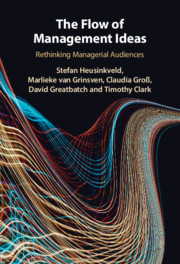Book contents
- The Flow of Management Ideas
- The Flow of Management Ideas
- Copyright page
- Contents
- Figures
- Tables
- Acknowledgements
- 1 The Flow of Management Ideas
- 2 Studying Audiences
- 3 Creating a Positive Atmosphere among the Audience
- 4 Conveying the Applicability of Ideas to Audience Members
- 5 Defining Audience Orientations
- 6 Understanding Audience Dynamism
- 7 Managerial Audiences in Organisational Contexts
- 8 Managerial Audiences and Fan Involvement
- 9 Conclusion
- Appendix A Overview of Informants
- Appendix B Glossary of Transcription Symbols
- References
- Index
6 - Understanding Audience Dynamism
Published online by Cambridge University Press: 22 May 2021
- The Flow of Management Ideas
- The Flow of Management Ideas
- Copyright page
- Contents
- Figures
- Tables
- Acknowledgements
- 1 The Flow of Management Ideas
- 2 Studying Audiences
- 3 Creating a Positive Atmosphere among the Audience
- 4 Conveying the Applicability of Ideas to Audience Members
- 5 Defining Audience Orientations
- 6 Understanding Audience Dynamism
- 7 Managerial Audiences in Organisational Contexts
- 8 Managerial Audiences and Fan Involvement
- 9 Conclusion
- Appendix A Overview of Informants
- Appendix B Glossary of Transcription Symbols
- References
- Index
Summary
In this chapter we explore possible volatility in audience orientations in more depth by asking: How and why do audience members’ consumption orientations shift throughout the communication process? Drawing on interview data with management practitioners who have attended management guru lectures, we stress the need for a more dynamic understanding of audience responses that can account for the individual-level variability in consumption orientations. First, by showing how individual audience members’ orientations are not necessarily limited to a single category and cannot be considered a permanent state, our findings seek to move beyond conceptions of managers’ attitudes towards management gurus and their ideas as relatively static. In particular, we identify three forms of shifts (involvement-induced, utility-induced and alternating) in managerial audience members’ consumption orientation amongst individual audience members that may occur during the communication process. Second, we explain how these shifts are related to the individual audience members’ expectations and broader management knowledge consumption pattern.
Keywords
- Type
- Chapter
- Information
- The Flow of Management IdeasRethinking Managerial Audiences, pp. 114 - 140Publisher: Cambridge University PressPrint publication year: 2021

